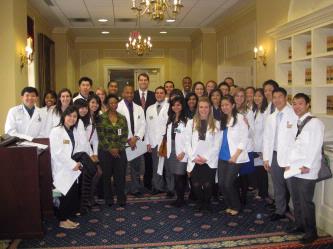Students Advocate for Their Profession at Maryland General Assembly
Students met with state legislators and delegates to explain, explore, and enhance new health care programs and opportunities for pharmacists.

By Steve Berberich
March 2, 2011
More than 200 students, faculty, and staff from the University of Maryland School of Pharmacy met face-to-face with state senators and delegates on Feb. 17 to push for their support on issues important to the pharmacy profession.
The event was part of the Maryland Pharmacy Coalition’s annual Legislative Day at the Maryland General Assembly in Annapolis.
One key issue this year is the expansion of the Maryland P3 (Patients, Pharmacists, Partnerships) Program in which pharmacists, working with physicians, assist chronic disease patients with medications, testing, and disease management. The program, a partnership of the School of Pharmacy, the Maryland Pharmacists Association, and the Maryland Department of Health and Mental Hygiene, has shown savings of $900 to $1,000 a year for each patient’s employer.
The students also said that the state could capture a return on investment of an estimated $17.5 million annually if the P3 Program’s medication services were extended to enrollees of Medicaid, a state administered program.
Another key message this year was thanking legislators for supporting construction of the School’s state-of-the-art Pharmacy Hall Addition, which was completed last year.
They also asked for legislators’ help to expand patient point-of-care rules for pharmacists. They urged the lawmakers to take action on legislative “language” that has languished in an advisory committee since last year to expand point-of-care, allowing pharmacists to perform Clinical Laboratory Improvement Amendments-waived testing (CLIA). CLIA is a standard by which the Centers for Medicare & Medicaid Services regulates U.S. laboratory testing performed on humans.
Third year student pharmacist Vicky Dang, explained, “There are certain tests that we are trained in our School to perform, but, as of now, we are not technically allowed to perform. These are tests that patients can do themselves but sometimes need help.” She said glucose monitoring for diabetes patients, for example, “can be really tricky to start up and pharmacists can be helpful.”
Overall, CLIA allows pharmacists to follow a patient who needs help to do minimum blood sampling, or to help gather information on his or her hyperlipidemia status [such as cholesterol and triglycerides], and anti-coagulation status.
During the House of Delegates morning session, the School’s Vote & Vax Initiative for administering influenza vaccines on Election Day 2010 was recognized from the floor with a resolution. On Election Day 2010 in Prince George’s County, students and faculty from the School provided seasonal ful vaccine to 153 individuals, 42 of whom were vaccinated against seasonal flu for the first time. The initiative was a project of the School’s American Pharmacists Association-Academy of Student Pharmacists and the Student Section of the Maryland Public Health Association.
Legislators thanked the students for visiting, sending them off with messages of support and offering career and life lessons to help them succeed as working pharmacists.
Senator Robert Garagiola of Montgomery County said, “As pharmacists in your communities, use that voice on issues because the representatives get bombarded with requests … In many respects, this is where the rubber meets the road. What the legislature does depends on who gets heard.”
Garagiola urged the students to stay alert in the next several years to “many new rules” as health care reform laws affect how physicians and pharmacists practice. “There will be a huge ripple throughout health care services and economics.”
Delegate David Rudolph of Cecil County who is also a member of the School of Pharmacy’s Board of Visitors, said, “Many people don’t understand how important the role of the pharmacist is to society, including some doctors. But my opinion is that we need pharmacists more than ever. I believe that you serve a tremendous benefit, but the general public doesn’t always understand.”
Delegate Jolene Ivey of Prince George’s County said, “Thank you for visiting and educating us, because we are not experts on very much. We are generalists and need experts like you to come in and let us know what is going on.”
Delegate Melvin Stukes of Baltimore City asked the students for “more knowledge on the real differences between the generic drugs and brand name drugs.” The School of Pharmacy is currently working with the Food and Drug Administration on a multi-million dollar research project to compare the efficacy of generic and name brand medications.
